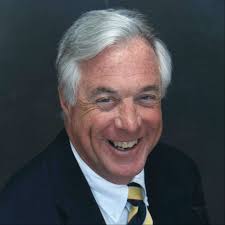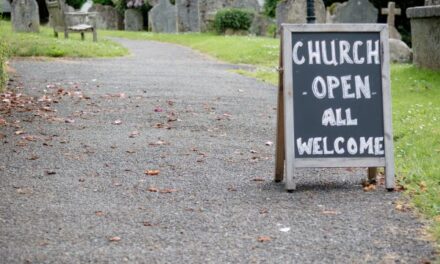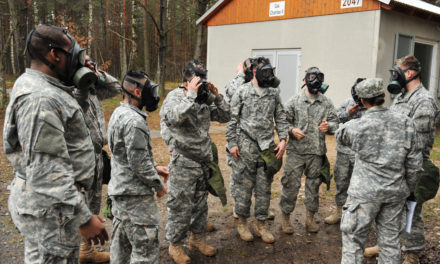The Art of Letting Go
By Lawrence Traynor
Jacksonville Beach, Fla.
“She told me to follow her to the edge
I said, ‘No, I am afraid”
She told me again to come to the edge
I said, ‘No, I am afraid I will fall’
I came to the edge and she pushed me
and I flew”
Anonymous
Why do we Christians long for control knowing it is only when we let go (fly), abdicating all certainty and control that we overcome our innermost fears?
It is in our surrendering control, not drinking, which terrifies us, alcoholics. Based on my disease’s penchant for denial, stopping is the last thing I ever wanted to do. I have learned that denial (“deNile”) is not just a river that flows through Egypt! Why is it so difficult for me to surrender, to let go? The irony is to “win” in life (sobriety) necessitates my letting go with unconditional surrender.
Anyone reading this, who like me, is battling alcoholism knows that reaching out for help is what we should do. But don’t. Surrender flies in the face of everything I have been taught since childhood and does not come easy to me.
My personal recovery teaches me that my alcoholism is a chronic, progressive, brain disease characterized by an impaired ability to control alcohol despite the certainty of incurring adverse social, occupational, or health consequences.
Alcoholism is often referred to as a family disease and similar to other mental health disorders, frequently passed genetically among extended family members. The fruit (grape) rarely falls far from the vine.
One “letting go” metaphor that helps me, places me all alone, stranded in the middle of the ocean and on the verge of exhaustion, is that I am relentless in my continuing efforts to survive. Frantically treading water, convinced that no other alternative to drowning exists for me. It is at this very point of vulnerability where surrender takes place. It is not until I realize that by surrendering and becoming perfectly still, lying on my back looking toward the sky, as I float that I am at peace knowing I can and will survive.
I simply need to let go. The experience of surrendered release frequently surfaces upon exhaustion, the moment I “give up” my efforts, permitting myself to simply float and survive.
No matter how hard I deny to myself, family, loved ones, and friends, I knew in my heart I was no longer in control of my drinking. This knowing brings me closer to surrender. If you think you have a problem with alcohol, you probably do.
Often, alcoholics will resort to seeking help only when our addiction leads to hitting our “bottom,” allowing us to become ready and willing to let go, surrender and finally give up being sick and tired of being sick and tired.
Should you ask me as to the importance of surrender to getting sober you will quickly understand how crucial it was and is. The first step in every 12-Step program is the admission of powerlessness and the need for absolute surrender to win the addiction battle. I must continue to seek help for what I cannot face or accomplish alone; in seeking help, I accept my own powerlessness. Again, it is my denial that most often stops me in my tracks. It is in acceptance and admission, in acknowledging I am not in control when my spiritual journey begins. I have come to believe that peace and serenity are only obtained by relinquishing my ego-driven demand for control.
What prohibits our ability to let go often resides in taking ourselves so very seriously. The seventeenth-century spiritual teacher, Jean-Pierre Caussade, described this self-destructive reasoning and the inability to let go as, “pious pig-headedness.” In other words, to simply hone our ability to lighten up goes a long way toward our success in letting go. We are not by nature, “a glum lot” as 12-Step literature suggests, and need simply to stop playing God.
Maybe the greatest paradox in life is the insight gained in recognizing we are in control and successful only when we let go. This is the paradox of surrender as surrender begins with the acceptance that we are powerless and not in control. We give up control subsequently as a result of understanding and accepting we are not God and not in control.
I always believed I could control my drinking any time it becomes necessary. The simple truth is I was living a lie and possessed a secret I dare not share with anyone. Deep down inside I knew I was not able to control my drinking. It seems my self-discipline and ability to control my alcohol intake had essentially evaporated.
I believe surrender begins and access to inner peace and serenity is established with the acceptance that I am not and never have been in control – in reality, I am not in control of much of anything.
Another painless way of breaking the chains of control of alcoholism is discovered in the magic of not being mentally attached to a situation’s specific outcome. The American philosopher and psychologist, William James, proclaims the importance of being genuinely indifferent to what becomes of it all in his study and writings contained in The Varieties of Religious Experience.
What is the response to letting go? Prayer and forgiveness.
Prayer is my response to the realization, to my discovery that I am not in charge, not in control, and not God. Often my prayers are a silent cry and plea for help and guidance from the acknowledgment of a “higher power,” a power greater than myself.
It is imperative as Christians we forgive our loved ones who slowly lose their addiction battle with the Big Bottle (alcohol) and or the Little Bottle (pills and other mood-altering drugs) and remember they are sick and suffering from a genetic, family disease and not a lack of willpower or control. To forgive, to truly forgive, involves letting go of the deep-seated feeling of resentment, the identification of self-as-victim. For me, forgiveness appears when I let go of the feeling of resentment by surrendering the vision of myself-as-victim. Forgiveness, I have come to believe has to do with letting go of the past – giving up the claim to control the past and refusing to be controlled by it.
If a loved one, family member, or friend is struggling and losing their battle with the Big Bottle or the Little Bottle, remember it is not a question of willpower and self-control. They are sick and suffering from a disease.
If you, a family member, or a friend can relate to any of this and would like to talk, please call me. And if you do not reach out to me, reach out to someone. There are countless resources available including Rational Recovery, Celebrate Recovery, 12-Step Programs, clergy and both toll-free Substance Abuse and Mental Health Services Association (SAMHSA), and National Alliance on Mental Health Issues (NAMI).
You have to do this alone but not alone. Remember, even the Lone Ranger had Tonto.
________________________________________________________________________________
Lawrence (Laurie) Traynor lives in Jacksonville Beach, Florida. He is a member of the recovery community and volunteers his time free of charge in helping addicts and alcoholics, their loved ones, and their families locate drug and alcohol assistance resources. He can be reached at (904) 553-1600. Read more good news from Lawrence HERE.
________________________________________________________________________________







